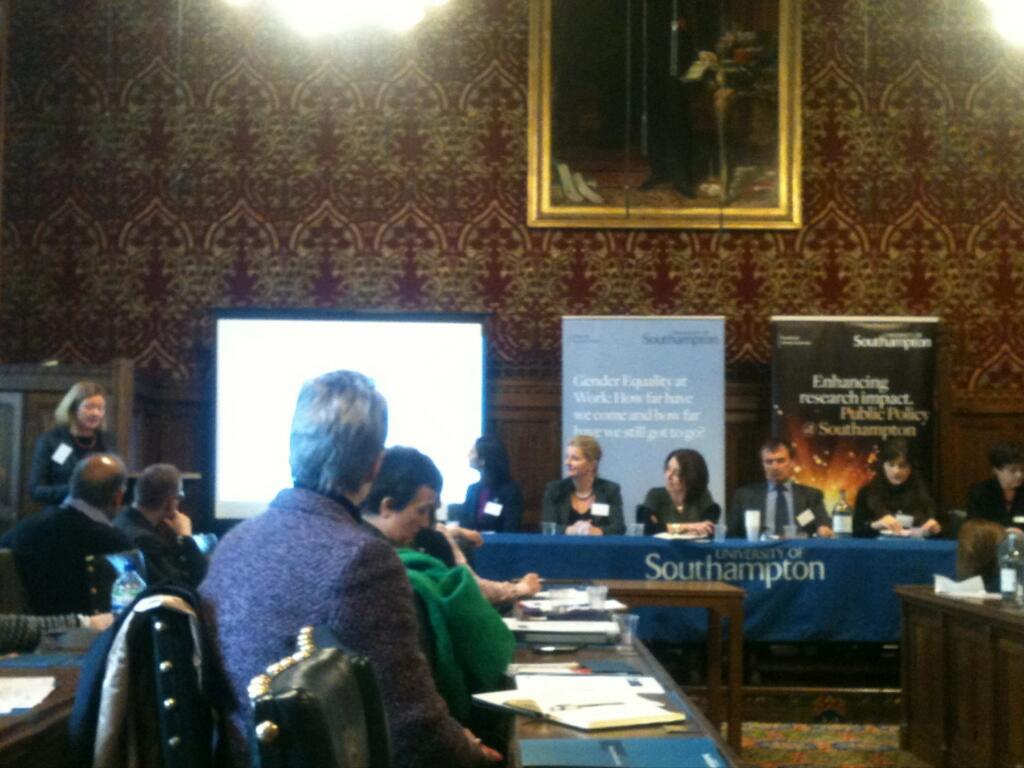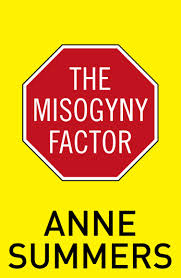storify by Roxanne Persaud
Category Archives: Policy Commission
Holiday balancing acts: misogyny, work and leadership
This month’s post is a review of Anne Summers’ TheMisogyny Factor by WFRC director Professor Catherine Pope
The directors of the Work Futures Research Centre like the idea of work-life balance even if the demands of our working lives sometimes seem to get in the way. One of the ways I try to inject some ‘balance’ into my life is through taking holidays when I spend time reading things that are not directly related to my research work – often fiction, but not always. If I venture abroad I try to pick up a book connected to the place I am visiting and this has been a great way of discovering new things – ranging from poetry to ancient history.
This year I was lucky enough to follow an academic visit to see colleagues at University of New South Wales involved in a project about organisational performance and accreditation with a trip to Australia. I was there just ahead of the general election so the news was full of electioneering and amongst this lots of discussion about Kevin Rudd the then Labour prime minister and his predecessor Julia Gillard.
The YouTube video of Julia Gillard’s misogyny speech of 2012 had already gone viral at this point, and this was followed by some UK media notably a self-penned piece after the election (in which Labor lost) in the Guardian on ‘power, purpose and Labor’s future’. Sydney Opera House hosted a discussion between feminist writer Anne Summers and Gillard which had picked up on some of the themes of sexism and leadership that Gillard had debated in speeches and writing – and these are revisited in Summer’s book ‘The Misogyny Factor (2013) which I bought for my holiday reading.
If we in the UK are disheartened about lack of progress on workplace equality agendas then this book suggests that our sisters in Australia have even more to complain about. Summers describes how, despite pioneering workplace reforms (Australia was the first to introduce the 8 hour day) and human rights (one of the first places to grant women the vote was South Australia in 1894), Australia lags behind in supporting working women. Australian women have lower participation in work than many other OECD countries and the gap between lifetime earnings of men and women is a shocking AUS $1 million. The Misogyny Factor is not a lighthearted read – Summers documents the political and legislative history of the struggle for gender equality in and outside work, and devotes a chapter to a fairly harrowing account of the way that Julia Gillard was taunted, attacked and vilified because of her gender in politics’ ‘top job’. Thankfully the book concludes with a chapter called ‘Destroying the Joint’. The title comes from a phrase which entered the Twitter lexicon when another feminist writer, Jane Caro, decided to take on the misogynists when radio presenter Alan Jones said ”Women are destroying the joint – Christine Nixon in Melbourne, Clover Moore here. Honestly.” Caro responded with her now famous tweet, “Got time on my hands tonight so thought I’d spend it coming up with new ways of ”destroying the joint” being a woman & all. Ideas welcome.” This ignited a social media debate about misogyny – in Australian politics, in the workplace and in the street which alongside other projects like #everydaysexism has become a global conversation about gender inequality. We are hoping to add to this conversation with our Policy Briefing on ‘Gender Equality at Work : where are we now and how far have we still to go?’ which will be out soon.
Gender Equality at Work … an Unfinished Job
 This has been a busy few weeks for those of us interested in issues of Gender Equality at Work. First, a report produced by Women’s Aid and the Fawcett Society in May showed that current government spending cuts have hit women disproportionately hard and are threatening to reverse any gains in gender equality which have been achieved over the last few years. A key factor here is that the Coalition’s austerity measures have cut public sector jobs –the very jobs which are largely occupied by women. This has an effect on both women’s incomes and their pensions. As Vivienne Hays, Chief Executive of the Women’s Resource Centre argues, “austerity should not be an excuse for discrimination”.
This has been a busy few weeks for those of us interested in issues of Gender Equality at Work. First, a report produced by Women’s Aid and the Fawcett Society in May showed that current government spending cuts have hit women disproportionately hard and are threatening to reverse any gains in gender equality which have been achieved over the last few years. A key factor here is that the Coalition’s austerity measures have cut public sector jobs –the very jobs which are largely occupied by women. This has an effect on both women’s incomes and their pensions. As Vivienne Hays, Chief Executive of the Women’s Resource Centre argues, “austerity should not be an excuse for discrimination”.  Later in May, Harriet Harman’s Commission on the experience of older women in the workplace revealed how, of all presenters over the age of 50 on British TV, only 18% are women: fewer than one in five. Whilst 39% of TV presenters as a whole are women, the vast majority of these are under 50. Once women hit the age of 50, a combination of ageism and sexism ensures their careers are on the decline. This is in spite of the fact that a BBC survey last year found that audiences would welcome more middle and older age women on television, providing positive role models and greater gender equality (Guardian 16 May 2013 p9). In June, we celebrated the centenary of the suffragette Emily Davison’s death. Exactly a century ago, she was knocked down by the King’s horse in the Epsom Derby as she attempted to draw attention to the Votes for Women Campaign. Fifty five years later, a group of women workers at the Ford Dagenham plant, infuriated by the pay structure which blatantly favoured male workers, made history by going on strike and marching to Whitehall. Their action resulted in the women agreeing to return to work and the conception of the Equal Pay Act of 1970. Now, in 2013, despite many improvements in gender equality in the workplace, there is still a 15% pay gap on full time hours, and this almost doubles in part time roles, many of which are filled by women. As the Fawcett Society argues, it is as if from 7th November to the end of the year, women work for nothing!
Later in May, Harriet Harman’s Commission on the experience of older women in the workplace revealed how, of all presenters over the age of 50 on British TV, only 18% are women: fewer than one in five. Whilst 39% of TV presenters as a whole are women, the vast majority of these are under 50. Once women hit the age of 50, a combination of ageism and sexism ensures their careers are on the decline. This is in spite of the fact that a BBC survey last year found that audiences would welcome more middle and older age women on television, providing positive role models and greater gender equality (Guardian 16 May 2013 p9). In June, we celebrated the centenary of the suffragette Emily Davison’s death. Exactly a century ago, she was knocked down by the King’s horse in the Epsom Derby as she attempted to draw attention to the Votes for Women Campaign. Fifty five years later, a group of women workers at the Ford Dagenham plant, infuriated by the pay structure which blatantly favoured male workers, made history by going on strike and marching to Whitehall. Their action resulted in the women agreeing to return to work and the conception of the Equal Pay Act of 1970. Now, in 2013, despite many improvements in gender equality in the workplace, there is still a 15% pay gap on full time hours, and this almost doubles in part time roles, many of which are filled by women. As the Fawcett Society argues, it is as if from 7th November to the end of the year, women work for nothing!  Such issues of Gender Equality at Work are the focus of the PublicPolicy@Southampton Policy Commission currently being conducted by Susan Halford and myself. After our successful seminar at the House of Commons on International Women’s Day on the 8th March, we are in the process of interviewing a range of influential stakeholders including Kay Carberry, the Assistant General Secretary of the TUC and Scarlet Harris, Women’s Equality Officer at the TUC; Sarah Jackson and Liz Gardiner of Working Families, Baroness Margaret Prosser and Helen Sachdev of the Barclay’s Bank. The interviews will inform a Policy Briefing which will be disseminated later in the year in which the key question : ‘Gender Equality at Work : where are we now and how far have we still to go?’ will be addressed. Keep checking for further updates!
Such issues of Gender Equality at Work are the focus of the PublicPolicy@Southampton Policy Commission currently being conducted by Susan Halford and myself. After our successful seminar at the House of Commons on International Women’s Day on the 8th March, we are in the process of interviewing a range of influential stakeholders including Kay Carberry, the Assistant General Secretary of the TUC and Scarlet Harris, Women’s Equality Officer at the TUC; Sarah Jackson and Liz Gardiner of Working Families, Baroness Margaret Prosser and Helen Sachdev of the Barclay’s Bank. The interviews will inform a Policy Briefing which will be disseminated later in the year in which the key question : ‘Gender Equality at Work : where are we now and how far have we still to go?’ will be addressed. Keep checking for further updates!
Pushing forward on gender equality at the House of Commons
The Work Futures Research Centre was delighted to celebrate the eve of International Women’s Day with a panel discussion on ‘Gender Equality at Work: how far have we come and how far have we still got to go?’, held in the Palmerstone Committee room at the Palace of Westminster, London.
This event marked the start of a new Public Policy@Southampton commission which will bring together the views of academics, policy makers, practitioners, employers and employees to consider how policy might make a difference to gender equality at work.
Professor Pauline Leonard opened the event with a brief overview of some of the key legislative, cultural and economic shifts in gendered aspects of work over the past 40 years. Professor Susan Halford then introduced our distinguished speakers: we began with a view from the top – courtesy of Lynne Berry OBE, deputy chair of the Canal and River Trust, who explored why women are so poorly represented on the executive boards of major companies. She spoke of ambitious targets for greater representation of women on company Boards, noting that while women have a bit more of a foothold in the voluntary and charitable sector they are still not taken seriously in FTSE 100 or FTS 250 companies. If we have a way to go at Board level, the picture was equally depressing when our next speaker Alan Whitehead MP reminded us that there had been under 400 women MPs since they first entered the House in 1918 (currently there are 146 women and 504 male MPs). Alan alerted us to the 32 men pictured in the splendid artwork adorning the committee room walls and the absence of a single female portrait; he suggested that without serious changes to selection and election processes this male dominance of the political sphere would continue.
Next, Samantha Mangwana, from Slater and Gordon Lawyers, spoke from the heart about the civil law cases she represents giving us anonymised, but extremely grim, accounts of the kinds of workplace harassment and sexual discrimination which women experience. In passing she mentioned that 1 in 7 women lose their jobs after maternity leave. Evangelia Bourmpoula from International Labour Organisation provided a wide ranging economists view of the global position of women in labour market using a wealth of research to demonstrate the continued vulnerability of working women in most of the world. We then returned to the UK context with our final speaker Helen Sachdev, a Director at Barclays, who described some of the very positive training and development programmes this bank has introduced to support and develop its women employees. She also gave a reflexive personal view of how gender discrimination had changed in her own working life – she felt that there was much to be positive about because women were less subject to overt and aggressive forms of discrimination, but that unconscious bias still persisted and could hold women back.
That may seem on the whole a fairly negative appraisal of how far we have come – yet the panel was inspirational and uplifting, not least because all the participants spoke passionately about how they overcame discrimination and used their work and experience to challenge gender inequality. Together the panel (and the lively contributions from the audience) provided a welcome and positive start to the work of the Policy Commission. We hope to report more here as this work continues but in the meantime want to acknowledge the fantastic start to the debate given by our splendid panel.
Further work on this commission will be continued, providing an evidence based Policy Briefing with a view to changing public policy in this area. Podcasts of the event will soon be available at http://publicpolicy.southampton.ac.uk/
Please visit the Work Futures Research Centre website for further news about the centre’s research at: http://www.southampton.ac.uk/wfrc/
Follow us on twitter @WorkFutures

